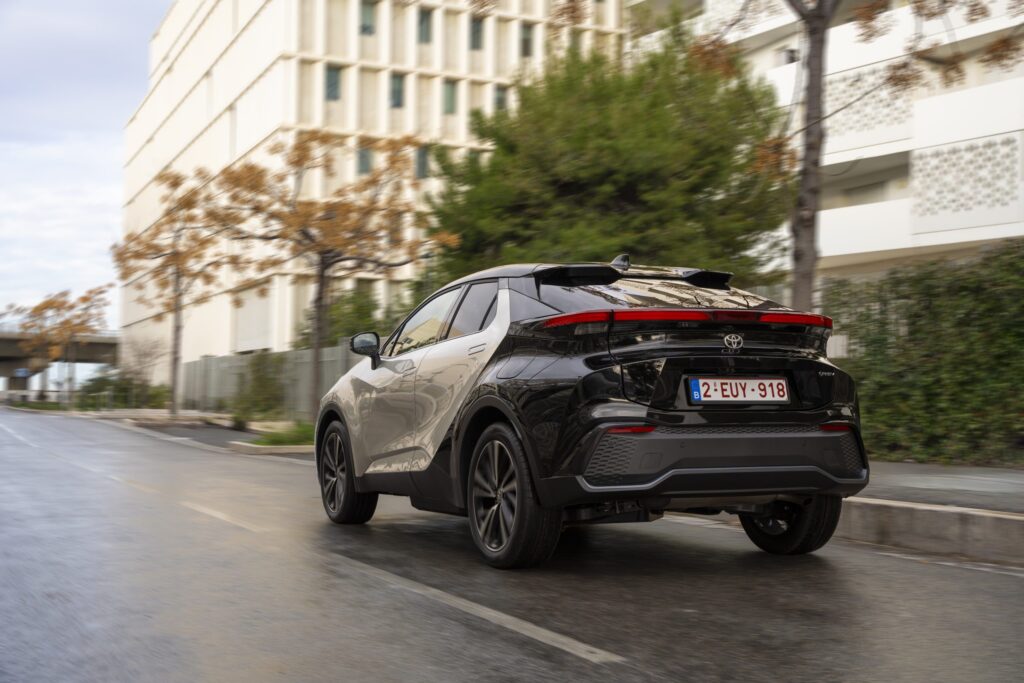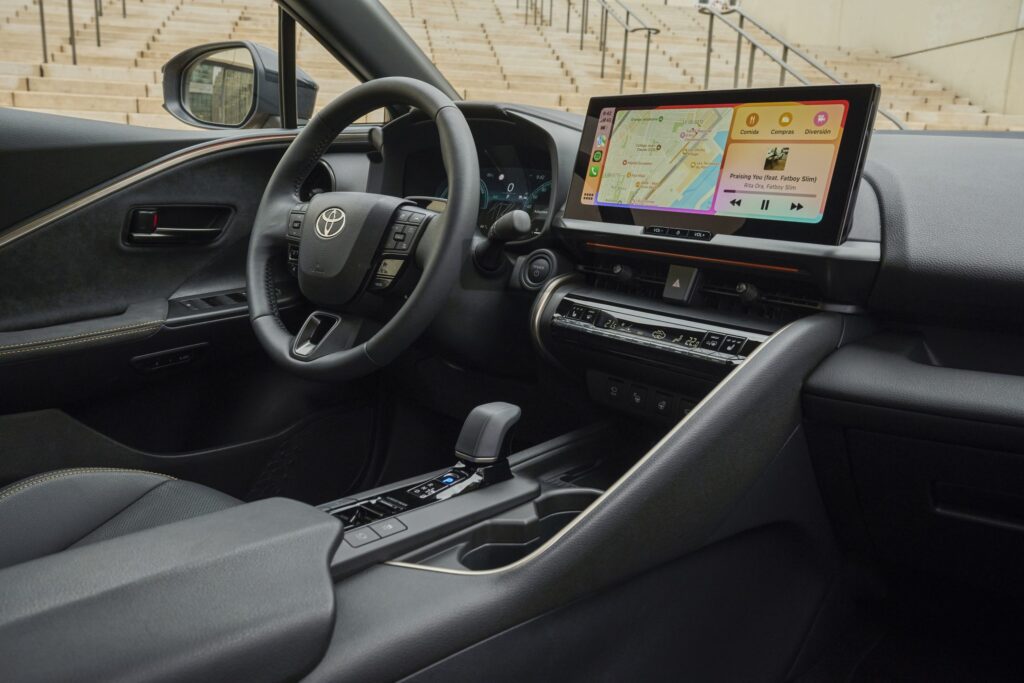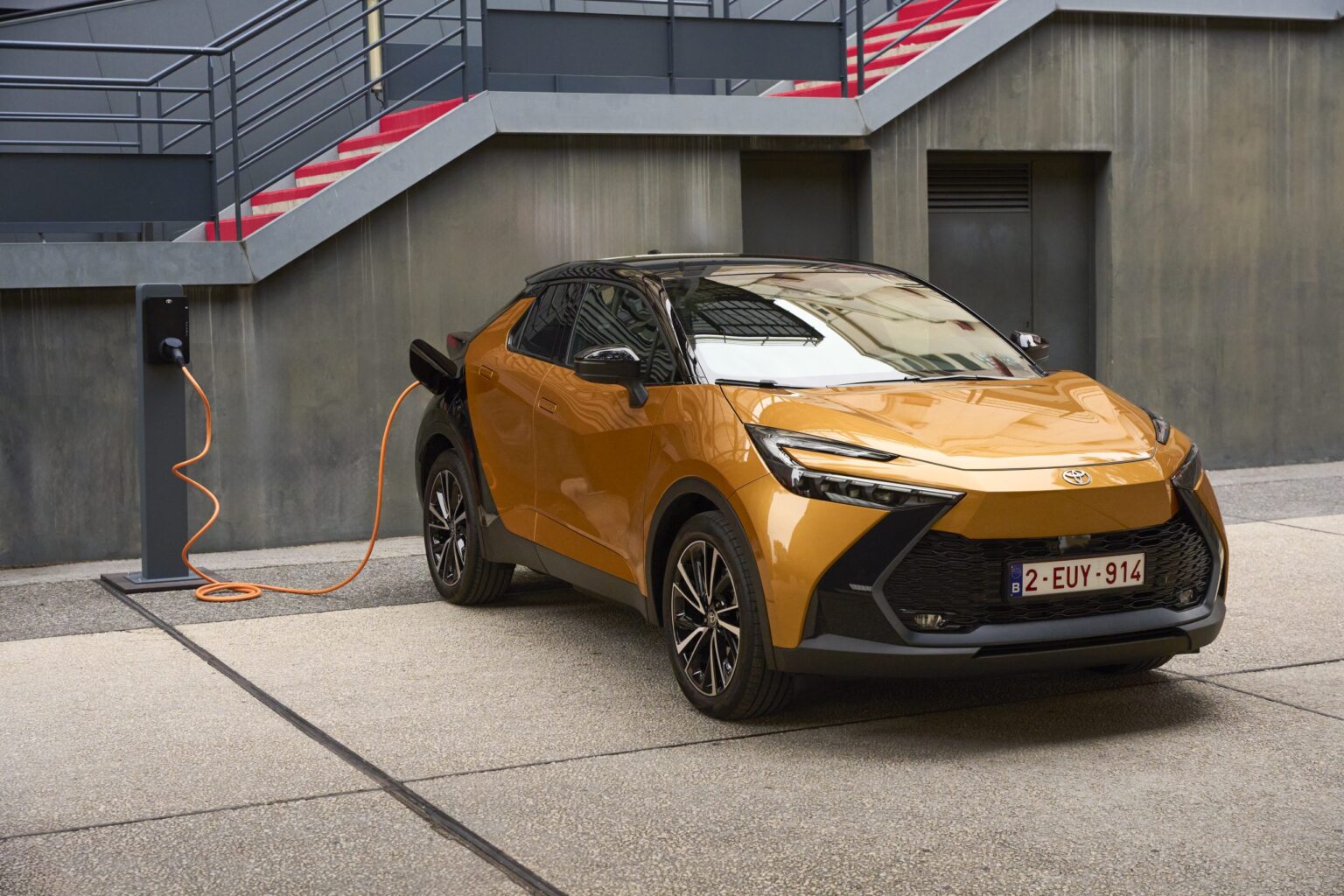The introduction of the Toyota C-HR Plug-in completes a fully electrified powertrain line-up for the all-new mid-size SUV range and reinforces Toyota’s multi-path technology strategy for reducing emissions on the route to eventual carbon neutrality.
The 2.0-litre Plug-in (PHEV) joins the recently launched 1.8 and 2.0-litre hybrid electric models in the line-up and like them benefits from the enhanced efficiency and performance enabled by fifth generation Toyota hybrid technology.
The breadth of choice reflects Toyota’s belief that customers need a variety of options for affordable and practical vehicles to accelerate the pace of CO2 reduction today and ensure a successful transition to zero emission mobility in the future.
The Toyota C-HR Plug-in provides the smooth, effortless drive of a pure electric vehicle with a driving range of up to 41 miles – in excess of the typical daily distance covered by most UK motorists. It has a dual character, automatically switching to hybrid electric running when its EV battery is depleted, giving drivers the reassurance and flexibility of Toyota’s class-leading hybrid technology and ensuring constant efficiency on every journey.

Agile and responsive performance
- Best-in-class PHEV powertrain providing EV daily driving capability and the flexibility of a hybrid electric system
- Powertrain settings tuned to provide throttle response and acceleration feel to suit European tastes
- No compromise in handling thanks to application of new technologies, weight-saving and increased body stiffness
A best-in-class PHEV powertrain combines with optimised handling, improved ride comfort and better braking for a more powerful, fun and engaging driving experience in the Toyota C-HR Plug-in. The latest Toyota hybrid technology delivers a class-leading balance of increased power and low emissions.
The new Plug-in model has a dual character. On the one hand, it has the responsive performance and smooth ride of a true EV on everyday journeys, with an all-electric range of up to 41 miles (WLTP combined) – further than the average daily distance covered by typical UK and European motorists.
The PHEV powertrain comprises a 161bhp (163 DIN hp.120kW) electric motor on the front axle, with energy stored in a high-output 13.6kWh lithium-ion battery, alongside a 2.0-litre engine with 150bhp (152 DIN hp/112 kW). Together these elements produce a total system power of 220bhp (223 Din hp/164kW), enabling 0-62mph acceleration in 7.4 seconds*.
Performance is matched by efficiency with fuel consumption from 353.1mpg and WLTP combined cycle CO2 emissions from 19g/km, A clutch-less dual motor system eliminates friction and wear, which means the Toyota C-HR Plug-in uses significantly less fuel when running in hybrid electric mode compared to most competitor PHEVs.
In common with the other electrified powertrains in the new Toyota C-HR range, the Plug-in has been tuned to suit UK and European tastes, using real-time data from drivers across the continent. For example, accelerator pedal input sensitivity has been recalibrated for easy control and rapid response.
The all-new Toyota C-HR builds on the engaging handling of the original model and where the Plug-in version is concerned there is no compromise on driving dynamics, thanks in part to the higher torsional rigidity and reduced vehicle mass provided by the car’s Toyota New Generation Architecture (TNGA).
In a first for any Toyota vehicle worldwide, the Toyota C-HR Plug-in features ZF frequency sensitive control (FSC) to enhance handling and ride comfort. The hydro-mechanical system increases damping force at low frequencies to gain superior body control, in roll and pitch, and during cornering. At high frequency, damping is reduced to improve ride comfort.
Enhancements have also been made to braking performance. The new Plug-in is fitted with 17-inch callipers and discs, together with the latest vehicle stability control systems. The 1.8 and 2.0-litre hybrids have 16-inch twin callipers and discs; all models have an electric parking brake and a redesigned brake pedal to help improve control and produce a more natural braking feel.
A combination of measures produces class-leading acoustic comfort. Engine speeds in motorway driving have been reduced by up to 500rpm and noise disturbance is reduced with the use of vibration damping and noise insulation. The car has a 0.318 drag coefficient, achieved through aerodynamic details to reduce the car’s frontal area and refine the body shape, including the underbody, to optimise airflow.

PHEV technology and control settings
- PHEV-specific development for greater efficiency and driving comfort
- Predictive Efficient Drive raises efficiency by optimising battery usage, in line with road and traffic conditions
- New geofencing function automatically optimises battery use to maximise EV driving capability in low emission zones
The new Toyota C-HR Plug-in is the result of dedicated development to make the most of the specific opportunities and requirements presented by a PHEV.
To raise the already impressive level of PHEV efficiency, the vehicle uses a pump to draw heat from air outside the car, as well as making use of engine heat, to support the air conditioning system in winter. This reduces power usage and thus helps improve the EV driving range.
The Toyota New Global Architecture (TNGA) modular platform allows the PHEV battery to located beneath the cabin floor, helping lower the car’s centre of gravity. This contributes to agile handling as well as avoiding loss of cabin or boot space.
An additional damper at the front of the vehicle enhances cabin acoustics and ride comfort, while additional TNGA components add to the rear suspension increase rigidity and improve handling.
The Predictive Efficient Drive system with its new geo-fencing function helps the driver keep one step ahead of what the journey may have in store. The system combines analysis of road and traffic conditions with ongoing learning about the driver’s regular routes and driving style to automatically optimise the use of the car’s all-electric mode. The geo-fencing function goes further by optimising battery use across the entire trip by analysing the planned route and automatically switching between EV and hybrid vehicle (HV) modes when travelling outside low emission zones (LEZs). This maximises the EV driving range available when entering an LEZ.
Regeneration boost offers a “one-pedal” style of driving, providing up to 80 per cent of the braking requirement, depending on which of three settings – gentle, medium and strong – is selected, making for easier driving in traffic.
Adaptive Hill Control Logic applies motor assistance when travelling downhill, reducing the need for the driver to use the brake pedal. It also modifies acceleration on undulating roads, based on the incline, for more intuitive performance.
Four powertrain operation modes are available: EV, auto EV/HV, HV and charging.
EV mode engages by default when the vehicle is started. The system will continue to operate in EV mode up to the limit of its EV driving range, regardless of how hard the accelerator is used.
The driver can select auto EV/HV mode, in which the engine will engage when extra power is needed, returning to EV running afterwards.
HV mode helps maintain the battery’s state of charge and is engaged automatically when battery charge runs low. It can also be manually selected by the driver.
The charging mode can be used when the driver wants to charge the EV battery when driving, using power generated by the engine.
In addition to the Drive Mode Select systems familiar Normal, Eco and Sport options, the Toyota C-HR also offers a Custom option which allows the driver to select their preferred powertrain, steering and air conditioning settings. These personalised settings can be saved for selection whenever desired.
The Toyota C-HR Plug-in has a 6.6kW on-board charger which allows the battery to be charged from zero to 100 per cent in less than two-and-a-half hours using the optional tri-phase cable and a wallbox power supply. A Mode 2 charging cable is supplied as standard for charging using a domestic electricity supply.
The MyToyota app can be used to start and stop charging remotely when the vehicle is plugged in. The app shows live progress during charging and the car’s EV range. The owner can create a schedule using the app, so the battery can be recharged at the most appropriate time, for example overnight to take advantage of lower energy tariffs.
MyToyota also provides access to the Toyota Charging Network, one of the largest pan-European EV charging networks. Users can search for charging station locations and see real-time availability, charging speeds and compatible plug types. A subscription service is available via the app to use and pay for charging services.
The Toyota C-HR Plug-in range comprises three grades – Design, Excel and GR Sport.
Design grade provides flush-fitting door handles, 18-inch alloy wheels with a machined finish, rear privacy glass, smart entry, an auto-dimming rear-view mirror, automatic wipers, power tailgate and parking sensors with automatic brake function. The front seats have integrated heaters and the air conditioning can be adjusted for left and right zones. The digital and connectivity provisions include a 12.3-inch customisable driver’s instrument display, 12.3-inch Toyota Smart Connect+ with navigation, Apple CarPlay and Android Auto smartphone integration, front and rear USB-C ports and a wireless phone charger. A Skyview fixed panoramic roof with thermal glass and bi-tone paint finish can be specified as options.

The safety and assistance package includes the latest, third generation Toyota Safety Sense with functions including Pre-Crash System, Adaptive Cruise Control, Lane Trace Assist, Road Sign Assist and Automatic High Beam. In addition, there is a Blind Spot Monitor which links to Safe Exit Assist to help prevent doors being opened into the path of vehicles approaching from the rear.
The Excel moves things to a higher level: 19-inch machined alloys, bi-tone exterior paintwork, front sports seats with suede-effect upholstery, ambient interior lighting with 64 colour settings and a panoramic roof. A Panoramic View Monitor provides 360-degree imaging of the car’s immediate surroundings for safe and accurate manoeuvring and the Toyota Safety Sense package is extended with Lane Change Assist, Front Cross Traffic Alert and Adaptive High-beam System headlights. Cornering lights and a driver monitor camera are also provided, while the options list includes a premium JBL audio system and a Tech Pack comprising a digital key, head-up display and digital rear-view mirror.
The GR Sport grade adds exterior and interior styling flourishes and details inspired by Toyota Gazoo Racing. The equipment features – in addition to the Design specification – include 20-inch machined GR Sport alloys, head-up display and JBL audio. A Premium Pack option includes panoramic roof, digital key, digital rear-view mirror, head-up display, cornering lights and Adaptive High-beam System. There is also the choice of a Safety Pack with driver monitor camera, Adaptive High-beam System with automatic levelling, cornering lights, Lane Change Assist, Panoramic View Monitor and Front Cross Traffic Alert.











